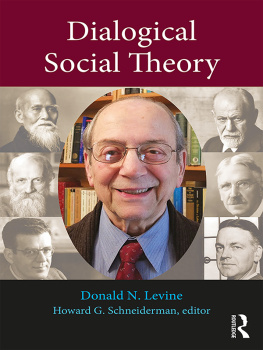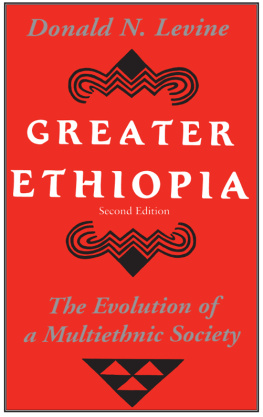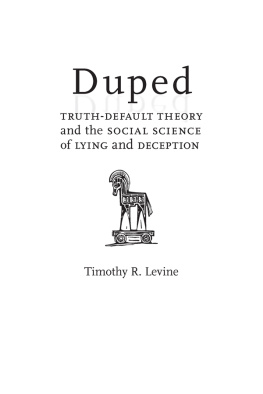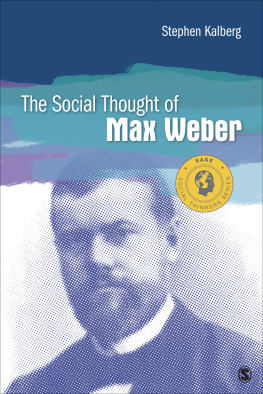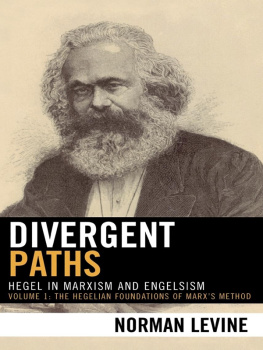DIALOGICAL SOCIAL THEORY
In his final work, Donald N. Levine, one of the great late-twentieth-century sociological theorists, brings together diverse social thinkers. Simmel, Weber, Durkheim, Parsons, and Merton are set into a dialogue with philosophers such as Hobbes, Smith, Montesquieu, Comte, Kant, and Hegel and pragmatists such as Peirce, James, Dewey, and McKeon to describe and analyze dialogical social theory. This volume is one of Levines most important contributions to social theory and a worthy summation of his lifes work.
Levine demonstrates that approaching social theory with a cooperative, peaceful dialogue is a superior tactic in theorizing about society. He illustrates the advantages of the dialogical model with case studies drawn from the French philosophes, the Russian intelligentsia, Freudian psychology, Ushibas aikido, and Levines own ethnographic work in Ethiopia. Incorporating themes that run through his lifetimes work, such as conflict resolution, ambiguity, and varying forms of social knowledge, Levine suggests that while dialogue is an important basis for sociological theorizing, it still vies with more combative forms of discourse that lend themselves to controversy rather than cooperation, often giving theory a sense of standing still as the world moves forward.
The book was nearly finished when Levine died in April 2015, but it has been brought to thoughtful and thought-provoking completion by his friend and colleague Howard G. Schneiderman. This volume will be of great interest to students and teachers of social theory and philosophy.
Donald N. Levine (19312015) was Professor Emeritus of Sociology at the University of Chicago and founder of an NGO, Aiki Extensions. He received a lifetime achievement award from the American Sociological Association.
Howard G. Schneiderman is Professor of Sociology at Lafayette College in Easton, Pennsylvania. He has written about some of sociologys leading scholars, and has recently authored Engagement and Disengagement: Class, Authority, Politics and Intellectuals (Routledge, 2017).
DIALOGICAL SOCIAL THEORY
Donald N. Levine
Howard G. Schneiderman, editor
First published 2018
by Routledge
711 Third Avenue, New York, NY 10017
and by Routledge
2 Park Square, Milton Park, Abingdon, Oxon, OX14 4RN
Routledge is an imprint of the Taylor & Francis Group, an informa business
2018 Donald N. Levine and Howard G. Schneiderman
The right of Donald N. Levine and Howard G. Schneiderman to be identified as authors of this work has been asserted by them in accordance with sections 77 and 78 of the Copyright, Designs and Patents Act 1988.
All rights reserved. No part of this book may be reprinted or reproduced or utilised in any form or by any electronic, mechanical, or other means, now known or hereafter invented, including photocopying and recording, or in any information storage or retrieval system, without permission in writing from the publishers.
Trademark notice: Product or corporate names may be trademarks or registered trademarks, and are used only for identification and explanation without intent to infringe.
British Library Cataloguing-in-Publication Data
A catalogue record for this book is available from the British Library
Library of Congress Cataloging-in-Publication Data
Names: Levine, Donald Nathan, 1931-2015, author. | Schneiderman, Howard G., editor.
Title: Dialogical social theory / Donald N. Levine and Howard G. Schneiderman.
Description: Abingdon, Oxon ; New York, NY : Routledge, 2018. | Includes bibliographical references and index.
Identifiers: LCCN 2017037909 | ISBN 9781412865500 (hardback) | ISBN 9781351294928 (ebook) | ISBN 9780815375470 (pbk.)
Subjects: LCSH: Sociology--Philosophy. | Social sciences--Philosophy.
Classification: LCC HM585 .L4849 2018 | DDC 301.01--dc23
LC record available at https://lccn.loc.gov/2017037909
ISBN: 978-1-4128-6550-0 (hbk)
ISBN: 978-0-8153-7547-0 (pbk)
ISBN: 978-1-351-29492-8 (ebk)
To Ruth, lifelong partner in dialogue
Doubtless the greatest surprise of my life took place in June 2002 at a dinner at my home with Charles Camic and Hans Joas after which, at dessert time, one of them slipped me an outline of the contents of what purported to be a Festschrift, The Dialogical Turn. I pushed my chair back and looked up in amazement at Hans, Chas, and my wife, Ruth. My face expressed sheer disbelief. One by one they shook their heads up and down, indicating that, yes, it was true, a group of my most respected colleagues had indeed conspired to produce a Festschrift in honor of my seventieth birthday in June 2002. One by one, I read off the names of the contributors. I never expected such an honor. Even now, thirteen years later, I am humbled by this gift. Not only was it an honor, but the contents led eventually to the production of this book. Even now, thirteen years later, I recall vividly the poignancy of this honor.
No less incredulous, I read that the editors and contributors were not simply honoring me, but were making the claim that I had somehow been responsible for a shift in orientation among significant members of the social science community. They were in fact alleging that I not only had played an important role in the work of that community, but had done so in a way that I had not been mindful of, a way that was close to my heart but that I had failed to previously recognize. That jolt left me with a sense of responsibility that before another decade elapsed, I had better get busy and make good on their recognition. They were alleging that my work had inspired a shift in orientation toward what might be glossed as dialogicality. That point then and there amounted to the planting of a seed which led to the present volume.
As I began to work on options for producing such a volume, it occurred to me that it could well fit as a second of two volumes of selected papers, each of which would make good on a theme from the final period of my work in social theory. One of these would celebrate my commitment to the theme of my 1997 address to the Theory Section of the ASA. The other would celebrate my commitment to the idea of dialogical social theory. All that remained to produce these volumes was to find a suitable publisher.
As it turned out, academic presses were no longer publishing volumes of this sort due to commercial pressures. Nevertheless, I resolved at the 2013 meetings of the ASA to push the idea along, a project facilitated by my winning the ASA lifetime achievement award.
By the greatest good fortune, when I visited the book display of Transaction Publishers, Howard Schneiderman recognized me and showed sufficient interest to introduce me to the president, Mary Curtis, and set in motion the process that led to contracts for both books, Social Theory as a Vocation and Dialogical Social Theory. There remained only the need for a capable and committed staff to help with all the necessary work. The staff of Social Theory as a Vocation lay right at hand. To Robert Owens, Jack Friedman, Stephen Weller, I owe a large debt of gratitude. As my health took a turn for the worse, I turned to a brilliant graduate student on the University of Chicagos Committee on Social Thought, Jonathan Baskin, to my office assistant, Joe Cronin, and to my ever faithful son, Bill Levine.

